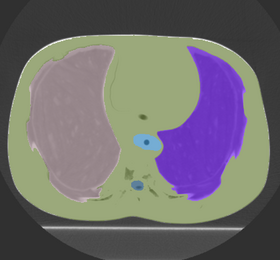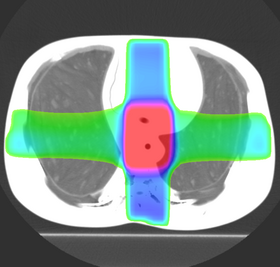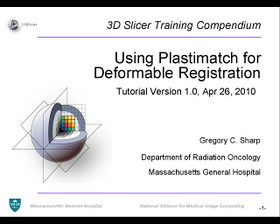Documentation/4.8/Modules/PlmBSplineDeformableRegistration
From Slicer Wiki
Home < Documentation < 4.8 < Modules < PlmBSplineDeformableRegistration
|
For the latest Slicer documentation, visit the read-the-docs. |
Introduction and Acknowledgements
|
Extension: Plastimatch
| |||||
|
Module Description
This is the plastimatch automatic (B-spline) deformable image registration module. It includes a multi-stage, multi-resolution pipeline, as well as multicore and GPU acceleration. Compared to other B-spline methods in 3d slicer, the plastimatch registration method might offer:
- superior accuracy for CT-CT (or CT-CBCT) registration
- faster results for MSE registration
However, to date there have been no rigorous comparisons of the various 3D Slicer registration methods.
Examples of how this module is being used:
- Intra-subject registration for adaptive radiotherapy
- Inter-subject registration for automatic segmentation
Use Cases
Tutorials
Panels and their use
|
Similar Modules
- Plastimatch DICOM-RT import
- Plastimatch DICOM-RT export
- Plastimatch Dose Comparison
- Plastimatch Dose Volume Histogram
- Plastimatch LANDWARP Landmark
- Plastimatch Synthetic Image Generation
- Plastimatch Threshold in a box
- Plastimatch XFORMWARP
References
- G Sharp, N Kandasamy, H Singh, M Folkert, "GPU-based streaming architectures for fast cone-beam CT image reconstruction and demons deformable registration," Physics in Medicine and Biology, 52(19), pp 5771-83, 2007.
- V Boldea, G Sharp, SB Jiang, D Sarrut, "4D-CT lung motion estimation with deformable registration: Quantification of motion nonlinearity and hysteresis," Medical Physics, 33(3), pp 1008-18, 2008.
- Z Wu, E Rietzel, V Boldea, D Sarrut, G Sharp, "Evaluation of deformable registration of patient lung 4DCT with sub-anatomical region segmentations," Medical Physics, 35(2), pp 775-81, 2008.
- G Sharp et al. "Plastimatch - An open source software suite for radiotherapy image processing," Proceedings of the XVIth International Conference on the use of Computers in Radiotherapy, May, 2010.
Information for Developers
| Section under construction. |






